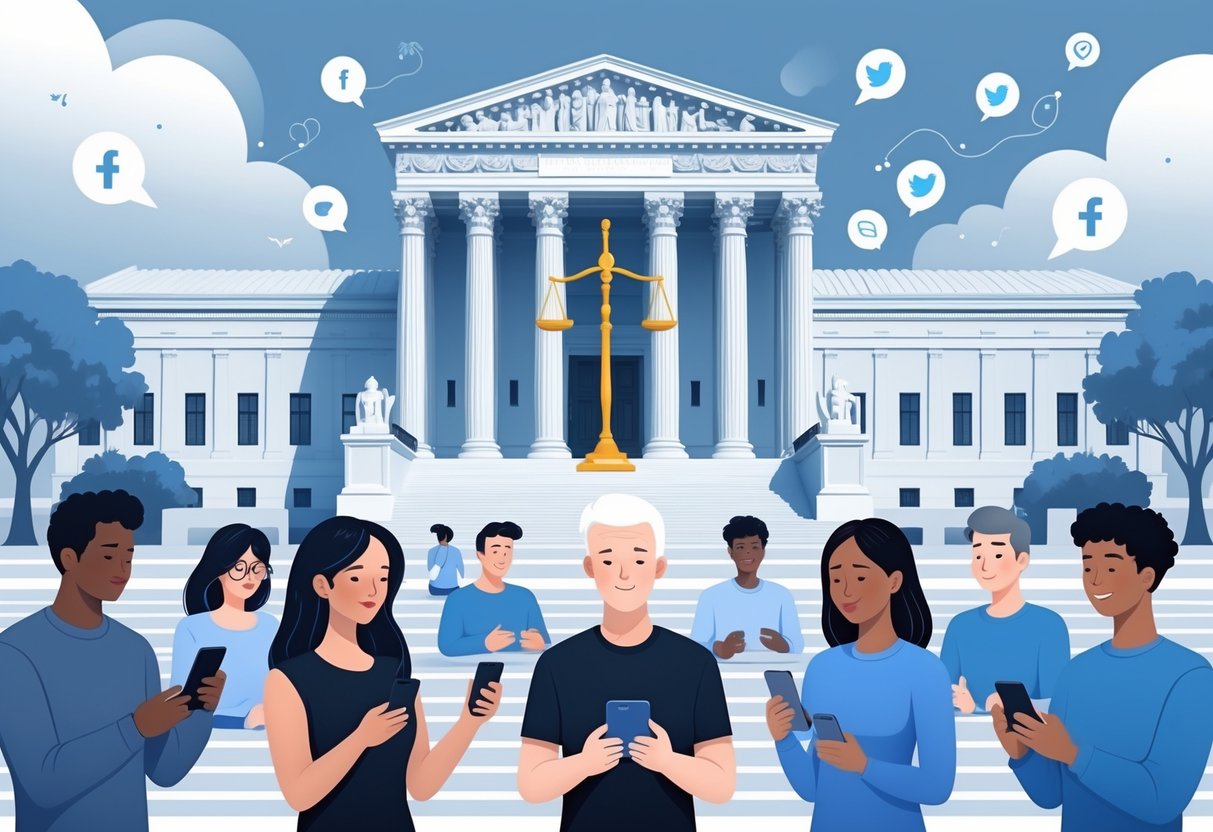The Supreme Court’s latest free speech ruling shifts how your words are protected on social media. The court made it clear that the government can’t force social media platforms to control or limit what you say online.
This decision backs your right to express yourself freely without government interference.

Now, social media companies get to set their own rules for content without the government stepping in. At the same time, the government’s power to regulate online speech is more limited than before.
Your experience on places like Facebook, Twitter, or Instagram will depend more on company policies than on government laws. That’s the reality, for better or worse.
It’s worth thinking about how this decision balances your free speech with the authority of social media companies. The government just can’t treat online conversations like public speech spaces and step in whenever it wants.
Key Takeaways
- Your free speech on social media is protected from government control.
- Social media companies have the right to manage content based on their policies.
- Government officials have limited power to regulate speech on online platforms.
Understanding the Supreme Court’s Free Speech Ruling
The Supreme Court’s decision lays out how free speech works on social media. It spells out who’s really in charge of what gets said, and what rights you and the platforms actually have.
You’ll get the main points of the ruling, the legal thinking behind it, and how the First Amendment fits in.
Overview of the Supreme Court’s Decision
The U.S. Supreme Court says social media platforms have their own free speech rights. That means they can choose what content to allow or remove on their sites.
The Court also said the government can’t force these platforms to carry speech they don’t want. You still have the right to free speech, but the platforms are private companies.
They’re protected when they moderate posts, unlike government bodies. The ruling blocks the government from interfering with editorial choices on social media.
Key Legal Principles Involved
Here’s the core of it: social media companies are private speakers under the law, not government speakers. That lets them set their own platform rules without breaking free speech laws.
The Court balanced your rights as a user with the rights of these companies. The government can’t restrict platforms’ free speech rights by forcing them to host certain messages.
This shields platforms from government overreach. It also keeps your rights in mind, even if it sometimes feels a bit messy.
Role of the First Amendment
The First Amendment protects free speech from government interference. The Supreme Court confirmed this covers both you and social media companies.
But here’s the catch: the First Amendment only limits the government, not private companies. So, platforms can moderate content without breaking the First Amendment.
They just can’t act as government agents to restrict your speech unfairly. The ruling draws the lines for how freedom of speech works online in today’s world.
Implications for Social Media Users
This Supreme Court ruling shapes how social media platforms run things and how your speech gets treated online. It sets boundaries for government control, but leaves lots of room for platforms to make their own choices.
Impact on Social Media Platforms
The ruling makes it clear: the government can’t force social media companies to host or remove specific content. Platforms get to decide what shows up and what doesn’t.
Sites like Facebook, Twitter, or TikTok use content moderation to filter out harmful or false information. They can still block or label posts that break their rules or community standards.
Just a heads up, these companies use algorithms to shape your feed. The decision protects their right to use these tools without government meddling.
Your experience on each site depends on how that platform balances free expression with safety. Sometimes, that balance feels a little off, doesn’t it?
Rights and Restrictions for Users
You have the right to express your views on social media, but this ruling doesn’t guarantee that
Government Officials and State Action Online
When government officials use social media, the rules about free speech can change depending on whether they act as private citizens or in their official roles.
It’s important to know the difference to understand when the First Amendment limits government control over speech. There are also challenges in holding officials accountable for what they post or how they handle their accounts.
Distinguishing Private and Official Social Accounts
You’ve got to know whether a social media account belongs to a government official personally or in their official capacity. If the account is used for official business, courts see it as “state action.”
The government can’t block or censor people’s speech there without violating the First Amendment. For example, local leaders often run separate accounts: one personal, one official.
Comments or posts on the official account are government speech, so officials can’t remove users just because they disagree with them. If the account is personal, the official generally has more freedom to control content—just like any private user.
Liability and Enforcement Challenges
When speech happens on government-run social media, you really have to consider enforcement limits. Courts have ruled that government officials can get into legal trouble if they block or censor people improperly on official pages.
But honestly, figuring out what’s private and what’s state action gets messy fast. Officials sometimes blur the lines by mixing personal and official content, or by juggling both types of accounts.
Groups like the Electronic Frontier Foundation (EFF) keep an eye on these situations. They’re out there trying to protect free speech and make sure officials don’t cross the line online.

